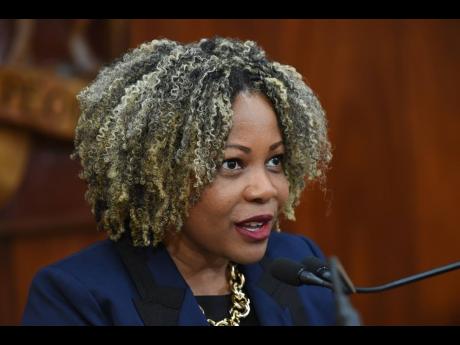Schoolyard power play
Education ministry warned against interfering in church-owned, trust institutions amid plan to increase authority to step in at schools
The Ministry of Education, Skills, Youth and Information is being advised to refrain from interfering in church-owned and trust schools, following the announcement that it intends to review legislation and regulations to increase its authority to intervene in internal conflicts within educational institutions.
Addressing yesterday’s post-Cabinet press briefing at Jamaica House in St Andrew, Education Minister Dr Dana Morris Dixon described as disappointing a recent incident at St James High School, which saw its principal, Joseph Williams, and chairman, Christopher McCurdy, embroiled in a heated argument that started in a staff meeting and continued into the institution’s parking lot.
This latest altercation was the culmination of a longstanding, bitter relationship between the school’s principal and chairman and resulted in classes at the school being suspended on Tuesday.
While expressing her displeasure at the “internal politics” of the principal and board chairman, which caused students to be absent from school, Morris Dixon declared that it needs to be fixed.
“We feel that we have to look at the legislation. We also have to look at the regulations. I know – I was on the Education Transformation Commission – and from then, we had said the law and the regulations don’t give enough power for stepping in, and that is something that we’re going to have to address because what happened is unacceptable,” she added.
However, Stewart Jacobs, president of the National Parent-Teacher Association of Jamaica (NPTAJ), believes that any intervention of this kind should be limited to government-owned schools.
“We have to be very careful that we don’t allow the centuries of hard work that the Church and the trust schools have put in place be eroded. You have to be careful. Government are politicians, and it all depends on what the political cycle is going to be – it can affect our education (system),” he said.
He stated that any review of the legislation governing the education sector should be directed to providing better clarity on the roles of principals and board chairmen.
“What contends now is that some chairmen think that they are operational, and they are not operational. They are strategic,” he said. “Some chairmen think that - especially in government schools - they tend to think that the school belongs to them and try all the time to usurp the authority of the principal, while in some cases, the principal thinks that they can do and not report to and advise the school board.”
Section 89 of the Education Regulation 1980 states that the board of management is responsible to the minister for the administration of the institution for which it has been appointed and in discharging its responsibilities.
Its duties include the conduct, supervision, and efficient operation of the institution and ensuring proper books of accounts and other matters in relation to the assets and liabilities of the institution.
Further, Section 9-10 of the Education Act (1980) outlines the actions the minister of education can take in the operations of a school when there is “serious failure in the successful working of any public educational institution and the board of management appointed has failed”.
This includes altering the constitution, rights, and powers of any governing body of such endowment or removing a governing body of such endowment and establishing a new governing body with such powers as the minister sees fit.
Jacobs noted that approximately 256 schools across Jamaica are owned by churches and trusts, and these schools generally outperform those owned by the Government.
“When you look at the schools that are failing at primary level, those are government schools and … the high schools, the purely controlled government schools where the members of parliament have all the say- those are the schools that are failing,” he said.

